Particle Physics
-
 Cosmology
CosmologyDebate grows over whether X-rays are a sign of dark matter
The dwarf galaxy Draco, which is chock-full of dark matter, doesn’t emit a band of X-rays that researchers hoped were produced by the mysterious invisible stuff.
By Andrew Grant -
 Planetary Science
Planetary ScienceBright minds, antineutrinos and more reader feedback
In the November 28, 2015, issue of Science News, readers discussed humanizing science, frog mating calls, antineurtrinos and Martian dust storms.
-
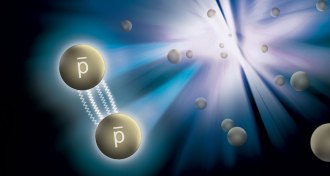 Particle Physics
Particle PhysicsAntiprotons match protons in response to strong nuclear force
The first study of how antiprotons interact with each other reveals yet again that particles of antimatter behave just like their ordinary matter counterparts.
By Andrew Grant -
 Particle Physics
Particle PhysicsTop 10 subatomic surprises
Nobel Prize–winning neutrinos rank among science’s most unexpected discoveries.
-
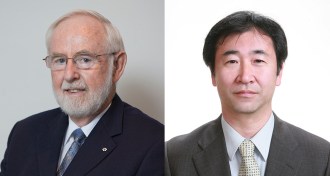 Particle Physics
Particle PhysicsNeutrinos’ identity shift snares physics Nobel
Arthur McDonald and Takaaki Kajita shared the 2015 Nobel Prize in physics for the discovery that neutrinos oscillate between different types, which demonstrates that the particles have mass.
By Andrew Grant and Thomas Sumner -
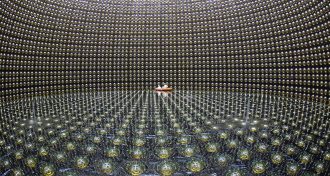 Particle Physics
Particle PhysicsDiscovery of neutrino mass earns 2015 physics Nobel
The discovery that subatomic particles called neutrinos have mass has won Takaaki Kajita of the University of Tokyo and Arthur McDonald of Queen’s University in Kingston, Canada, the 2015 Nobel Prize in physics.
By Andrew Grant -
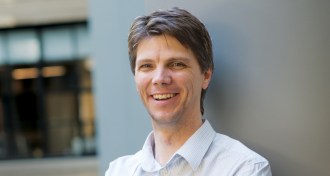 Particle Physics
Particle PhysicsWilliam Detmold: Looking deep into atoms’ hearts
MIT theoretical physicist William Detmold probes the fundamental bits of matter that combine to form the nuclei of atoms.
By Andrew Grant -
 Particle Physics
Particle PhysicsMap captures Earth’s antineutrino glow
Tiny subatomic particles called antineutrinos stream away from Earth at different concentrations across the globe, a new map illustrates.
By Meghan Rosen -
 Particle Physics
Particle PhysicsAntimatter doesn’t differ from charge-mass expectations
An experiment with unprecedented precision finds that protons and antiprotons have the same ratio of charge to mass, which is consistent with theories but disappoints many physicists.
By Andrew Grant -
 Physics
PhysicsElusive particle shows up in ‘semimetal’
Weyl fermions, which resemble massless electrons, have been spotted inside tantalum arsenide. Their discovery comes 86 years after they were proposed.
By Andrew Grant -
 Particle Physics
Particle PhysicsLHC reports pentaquark sightings
Two particles discovered at the Large Hadron Collider are composed of five quarks, not two or three like nearly every other known quark-based particle.
By Andrew Grant -
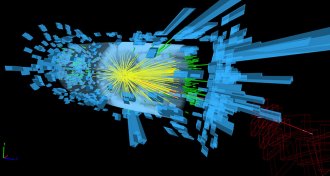 Particle Physics
Particle PhysicsLHC set to see beyond Higgs
Physicists hope a revamped Large Hadron Collider will discover new particles and forces that could help explain dark matter and other mysteries of the universe.
By Andrew Grant